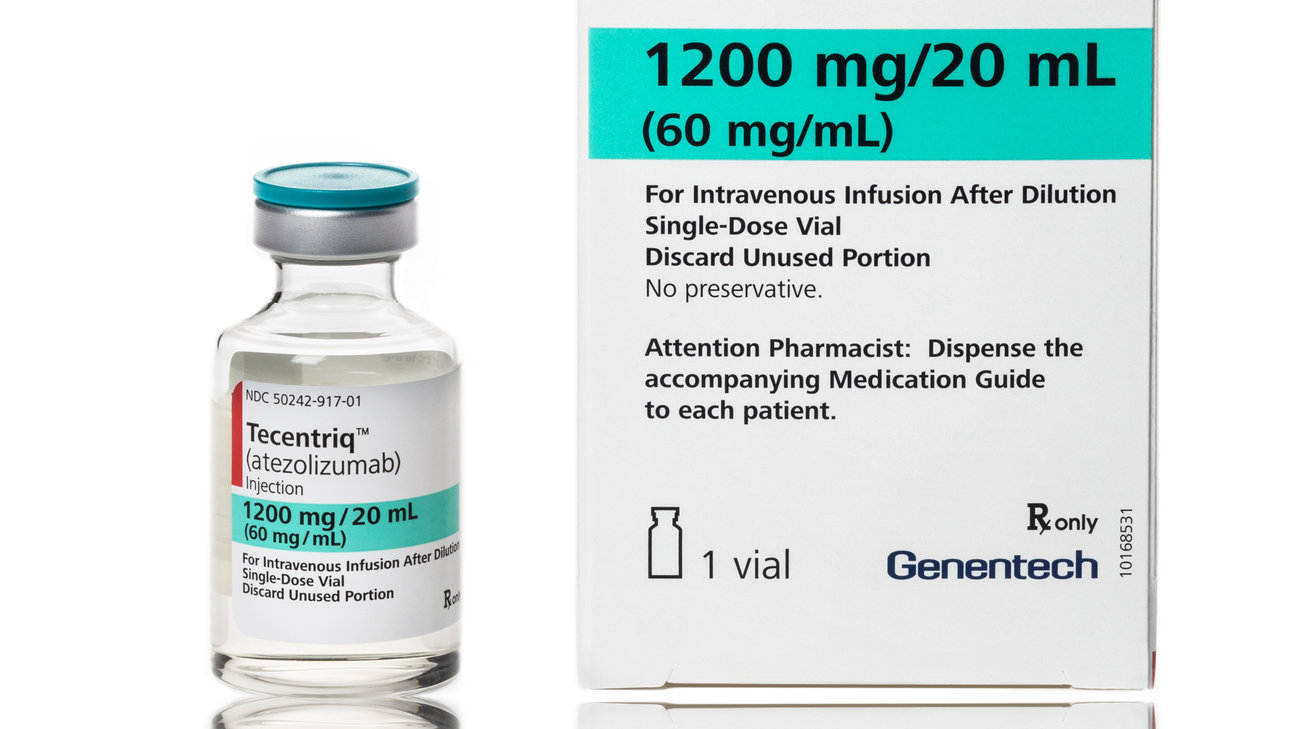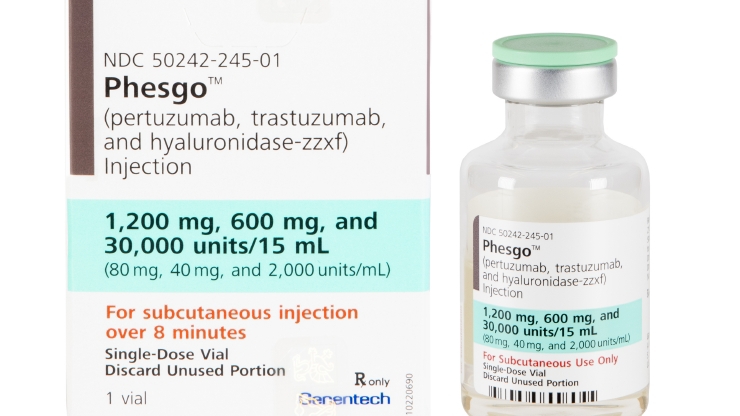Tecentriq (Atezolizumab) vs Phesgo (pertuzumab, trastuzumab, and hyaluronidase)
Tecentriq (Atezolizumab) vs Phesgo (pertuzumab, trastuzumab, and hyaluronidase)
Tecentriq (Atezolizumab) is an immune checkpoint inhibitor specifically targeting the PD-L1 protein, used primarily for treating various types of cancer, including non-small cell lung cancer, small cell lung cancer, urothelial carcinoma, and triple-negative breast cancer. Phesgo combines two monoclonal antibodies, pertuzumab and trastuzumab, with hyaluronidase, and is designed for the treatment of HER2-positive breast cancer, allowing subcutaneous administration. When deciding between Tecentriq and Phesgo, it is essential to consider the specific type of cancer, its molecular characteristics, such as PD-L1 expression or HER2 status, and the overall treatment plan as determined by a healthcare professional.
Difference between Tecentriq and Phesgo
| Metric | Tecentriq (Atezolizumab) | Phesgo (pertuzumab, trastuzumab, and hyaluronidase) |
|---|---|---|
| Generic name | Atezolizumab | Pertuzumab, Trastuzumab, and Hyaluronidase-zzxf |
| Indications | Urothelial carcinoma, non-small cell lung cancer, triple-negative breast cancer, hepatocellular carcinoma, and others | HER2-positive breast cancer |
| Mechanism of action | PD-L1 inhibitor, immune checkpoint inhibitor | HER2 inhibitors, enzyme |
| Brand names | Tecentriq | Phesgo |
| Administrative route | Intravenous infusion | Subcutaneous injection |
| Side effects | Fatigue, nausea, decreased appetite, urinary tract infections, fever, etc. | Hair loss, nausea, diarrhea, anemia, neutropenia, etc. |
| Contraindications | Patients with a history of severe hypersensitivity to atezolizumab or any of its excipients | Patients with a history of severe hypersensitivity to pertuzumab, trastuzumab, hyaluronidase, or any of their excipients |
| Drug class | Monoclonal antibody, Immune checkpoint inhibitor | Monoclonal antibodies, enzyme |
| Manufacturer | Genentech (Roche) | Genentech (Roche) |
Efficacy
Efficacy of Tecentriq (Atezolizumab) in Breast Cancer
Tecentriq (Atezolizumab) is an immune checkpoint inhibitor that has shown efficacy in the treatment of certain types of breast cancer. Specifically, it has been approved for use in combination with chemotherapy for the treatment of patients with unresectable locally advanced or metastatic triple-negative breast cancer (TNBC) that expresses PD-L1. Clinical trials have demonstrated that Atezolizumab, when used in this population, can significantly extend progression-free survival compared to chemotherapy alone. This benefit is particularly notable since triple-negative breast cancer is a more aggressive and difficult-to-treat form of the disease with fewer targeted therapies available.
The IMpassion130 trial, a pivotal study that led to the approval of Tecentriq for TNBC, showed that the addition of Atezolizumab to nab-paclitaxel significantly improved median progression-free survival in PD-L1-positive patients. Furthermore, an improvement in overall survival was observed, although this did not reach statistical significance in the interim analysis. As a result, Tecentriq has become an important option in the management of PD-L1-positive TNBC, offering hope for improved outcomes in this challenging patient population.
Efficacy of Phesgo (pertuzumab, trastuzumab, and hyaluronidase) in Breast Cancer
Phesgo is a combination of two monoclonal antibodies, pertuzumab and trastuzumab, with the enzyme hyaluronidase, and is used for the treatment of HER2-positive breast cancer. This fixed-dose combination is administered subcutaneously and provides a more convenient alternative to the standard intravenous formulations of pertuzumab and trastuzumab. The efficacy of Phesgo in breast cancer has been established in several clinical trials, showing that it is non-inferior to the intravenous administration of pertuzumab and trastuzumab when used in combination with chemotherapy.
The pivotal trial for Phesgo, the FeDeriCa study, demonstrated that the combination led to comparable levels of pertuzumab and trastuzumab in the blood, meeting its primary endpoint of non-inferiority in pharmacokinetics. Moreover, the study showed similar efficacy in terms of pathological complete response rates in patients with early HER2-positive breast cancer. This suggests that Phesgo maintains the proven therapeutic benefits of pertuzumab and trastuzumab while offering patients a quicker and less invasive method of administration. As such, Phesgo has become a valuable treatment option for patients with HER2-positive breast cancer, aiming to improve the quality of life without compromising efficacy.
Regulatory Agency Approvals
Tecentriq
-
European Medical Agency (EMA), European Union

-
Food and Drug Administration (FDA), USA

-
Health Canada

-
Pharmaceuticals and Medical Devices Agency (PMDA), Japan

-
Therapeutic Goods Administration (TGA), Australia

-
Medsafe (NZ)

Phesgo
-
European Medical Agency (EMA), European Union

-
Food and Drug Administration (FDA), USA

Access Tecentriq or Phesgo today
If Tecentriq or Phesgo are not approved or available in your country (e.g. due to supply issues), you can access them via Everyone.org.
How it works

Make an enquiry
Choose the medicine you want to buy, answer a couple of questions, and upload your prescription to speed things up. We’ll get back to you within 24 hours.


Make an enquiry
Choose the medicine you want to buy, answer a couple of questions, and upload your prescription to speed things up. We’ll get back to you within 24 hours.


Breeze through the paperwork
We'll guide you through the required documents for importing unapproved medicine, ensuring you have all the necessary information.


Get a personalized quote
We’ll prepare a quote for you, including medicine costs and any shipping, administrative, or import fees that may apply.


Receive your medicine
Accept the quote and we’ll handle the rest - sourcing and safely delivering your medicine.

Some text on this page has been automatically generated. Speak to your physician before you start a new treatment or medication.
Let's talk
If you have any questions, call us or send us a message through WhatsApp or email:
Contact us




